Related Research Articles

Bolivia, officially the Plurinational State of Bolivia, is a landlocked country located in western-central South America. It is bordered by Brazil to the north and east, Paraguay to the southeast, Argentina to the south, Chile to the southwest, and Peru to the west. The seat of government and administrative capital is La Paz, which contains the executive, legislative, and electoral branches of government, while the constitutional capital is Sucre, the seat of the judiciary. The largest city and principal industrial center is Santa Cruz de la Sierra, located on the Llanos Orientales, a mostly flat region in the east of the country.

La Paz, officially Nuestra Señora de La Paz, is the seat of government of the Plurinational State of Bolivia. With an estimated 816,044 residents as of 2020, La Paz is the third-most populous city in Bolivia. Its metropolitan area, which is formed by La Paz, El Alto, Achocalla, Viacha, and Mecapaca makes up the second most populous urban area in Bolivia, with a population of 2.2 million, after Santa Cruz de la Sierra with a population of 2.3 million. It is also the capital of the La Paz Department.

Sucre is the de jure capital city of Bolivia, the capital of the Chuquisaca Department and the sixth most populous city in Bolivia. Located in the south-central part of the country, Sucre lies at an elevation of 2,790 m (9,150 ft). This relatively high altitude gives the city a subtropical highland climate with cool temperatures year-round.
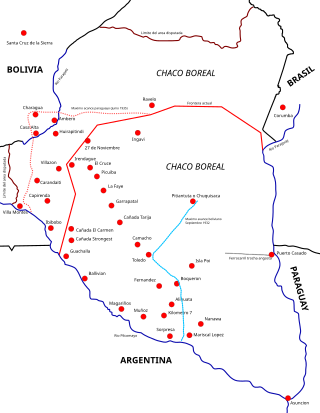
The Chaco War was fought from 1932 to 1935 between Bolivia and Paraguay, over the control of the northern part of the Gran Chaco region of South America, which was thought to be rich in oil. The war is also referred to as La Guerra de la Sed in literary circles since it was fought in the semi-arid Chaco. The bloodiest interstate military conflict fought in South America in the 20th century, it was fought between two of its poorest countries, both of which had lost territory to neighbours in 19th-century wars.

Bolivia traditionally has maintained normal diplomatic relations with all hemispheric states except Chile. Foreign relations are handled by the Ministry of Foreign Affairs, headed by the Chancellor of Bolivia, Rogelio Mayta.

The president of Bolivia, officially known as the president of the Plurinational State of Bolivia, is head of state and head of government of Bolivia and the captain general of the Armed Forces of Bolivia.
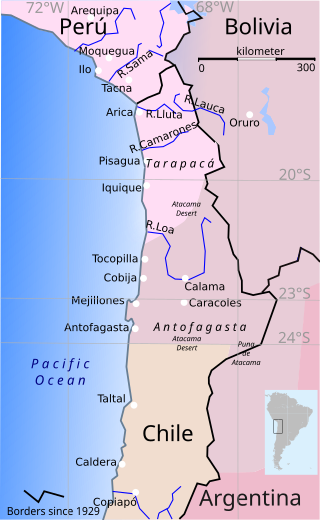
The War of the Pacific, also known as the Nitrate War and by multiple other names, was a war between Chile and a Bolivian–Peruvian alliance from 1879 to 1884. Fought over Chilean claims on coastal Bolivian territory in the Atacama Desert, the war ended with victory for Chile, which gained a significant amount of resource-rich territory from Peru and Bolivia.
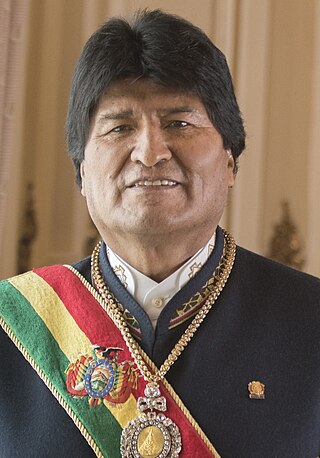
Juan Evo Morales Ayma is a Bolivian politician, trade union organizer, and former cocalero activist who served as the 65th president of Bolivia from 2006 to 2019. Widely regarded as the country's first president to come from its indigenous population, his administration worked towards the implementation of left-wing policies, focusing on the legal protections and socioeconomic conditions of Bolivia's previously marginalized indigenous population and combating the political influence of the United States and resource-extracting multinational corporations. Ideologically a socialist, he has led the Movement for Socialism (MAS) party since 1998.

Bolivia is a unitary state consisting of nine departments. Departments are the primary subdivisions of Bolivia, and possess certain rights under the Constitution of Bolivia. Each department is represented in the Plurinational Legislative Assembly—a bicameral legislature consisting of the Senate and the Chamber of Deputies. Each department is represented by four Senators, while Deputies are awarded to each department in proportion to their total population.

Santa Cruz de la Sierra, commonly known as Santa Cruz, is the largest city in Bolivia and the capital of the Santa Cruz department.

Cochabamba is a city and municipality in central Bolivia in a valley in the Andes mountain range. It is the capital of the Cochabamba Department and the fourth largest city in Bolivia, with a population of 630,587 according to the 2012 Bolivian census. Its name is from a compound of the Quechua words qucha "lake" and pampa, "open plain." Residents of the city and the surrounding areas are commonly referred to as cochalas or, more formally, cochabambinos.

The Bolivia national football team, also known as La Verde, has represented Bolivia in international football since 1926. Organized by the Bolivian Football Federation (FBF), it is one of the ten members of FIFA's South American Football Confederation (CONMEBOL).

El Alto is the second-largest city in Bolivia, located adjacent to La Paz in Pedro Domingo Murillo Province on the Altiplano highlands. El Alto is today one of Bolivia's fastest-growing urban centers, with an estimated population of 943,558 in 2020. It is also the highest major city in the world, with an average elevation of 4,000 m (13,123 ft).

The Bolivian Football Federation is the governing body of football in Bolivia. It was founded in 1925, making it the eighth oldest South American federation. It affiliated to CONMEBOL and FIFA in 1926 and is in charge of Bolivia national football team.

The vice president of Bolivia, officially known as the vice president of the Plurinational State of Bolivia, is the second highest political position in Bolivia. The vice president replaces the president in his definitive absence or others impediment and is the ex officio President of the Legislative Assembly.
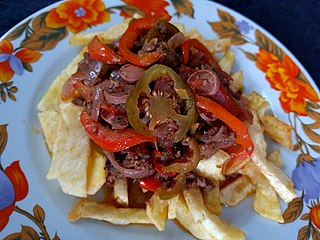
Bolivian cuisine is the indigenous cuisine of Bolivia from the Aymara and Inca cuisine traditions, among other Andean and Amazonian groups. Later influences stemmed from Spaniards, Germans, Italians, French, and Arabs due to the arrival of conquistadors and immigrants from those countries. The traditional staples of Bolivian cuisine are corn, potatoes, quinoa and beans. These ingredients have been combined with a number of staples brought by the Spanish, such as rice, wheat, beef, and pork.
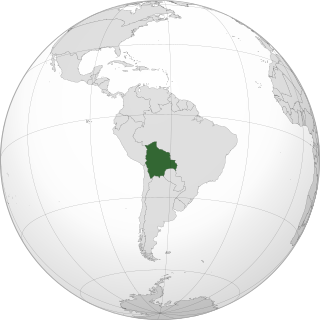
The history of the Jews in Bolivia goes back to the colonial period of Bolivia in the 16th century. In the 19th century, Jewish merchants came to Bolivia, most of them taking local women as wives and founding families that merged into the mainstream Catholic society. This was often the case in the eastern regions of Santa Cruz, Tarija, Beni and Pando, where these merchants came either from Brazil or Argentina.

Luis Alberto Arce Catacora, often referred to as Lucho, is a Bolivian banker, economist, and politician serving as the 67th president of Bolivia since 2020. A member of the Movement for Socialism, he previously served as minister of finance—later minister of economy and public finance—from 2006 to 2017, and in 2019.

The COVID-19 pandemic in Bolivia was a part of the worldwide pandemic of coronavirus disease 2019 caused by severe acute respiratory syndrome coronavirus 2. The virus was confirmed to have spread to Bolivia on 10 March 2020, when its first two cases were confirmed in the departments of Oruro and Santa Cruz.
References
- ↑ "Periodicos Diarios de Bolivia". prensaescrita.com. Prensa Escrita. Retrieved 26 July 2012.